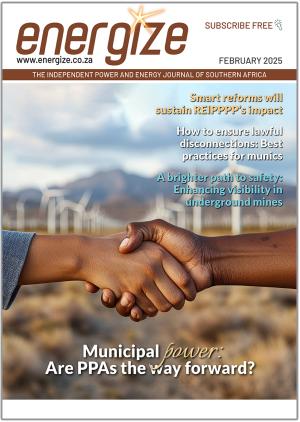In response to the evolving needs of the energy and water sectors and the surge in demand for green skills, the Energy and Water Sector Education and Training Authority (EWSETA) has announced the development and implementation of specialised training programmes. The initiative aims to align with industry requirements and technological advancements in the fields of renewable energy and water resource management.
Among the forthcoming courses are water works management, solar panel installation, wind turbine maintenance, and various other green energy solutions. Mpho Mookapele, the Chief Executive Officer of EWSETA, addressed the media at an event held in Rosebank yesterday (27 February), highlighting the organisation's commitment to bridging the “green skills gap” and ensuring South Africa's workforce remains competitive on the global stage.
Mookapele referred to growing concerns regarding macroeconomic trends and technological disruptions in labour markets worldwide. Citing data from the International Energy Agency (IEA), he noted that 4.7 million more people were employed in clean energy globally in 2022 than in 2019. The urgency to address the 'green skills gap' was further emphasised by a recent LinkedIn report, revealing that only 1 in 8 employees globally possess one or more green skills.
“We don't want to leave South Africa's young people and workforce behind. It is important for businesses to share their skills plans with us so that we can capacitate learners accordingly. Together with government and private entities, we are collaborating to fast-track skills development initiatives,” said Mookapele.
EWSETA is actively responding to the rapidly evolving energy sector by developing qualifications that address gaps in the curriculum. New skills programmes include wind turbine operation, biogas installation, microgrid and battery energy storage operation, solar PV manufacture, design, and installation.
Mookapele emphasized the importance of collaboration with industry to build necessary capabilities: “When the sector needs certain skills, we are committed to working together with industry to build these capabilities.”
In addition to focusing on the photovoltaic (PV) sector due to the increased adoption of solar energy, EWSETA is working to establish minimum skills requirements for the PV Green Card training. This quality assurance standard for solar PV installers aims to mitigate against substandard installations.
The organisation is also seeking partnerships to retrofit technical workshops for TVET colleges, ensuring they stay aligned with industry developments. In the water sector, EWSETA collaborates with water boards, municipalities, and private industries to develop qualifications addressing challenges in clean drinking water and wastewater treatment plants.
To address the evolving water landscape, EWSETA has registered a Water Works Management NQF 6 qualification and is in the process of developing a Water Resource Management qualification at NQF level 8. A skills program for a Water Conservation Practitioner is also in the works to meet industry demands.















